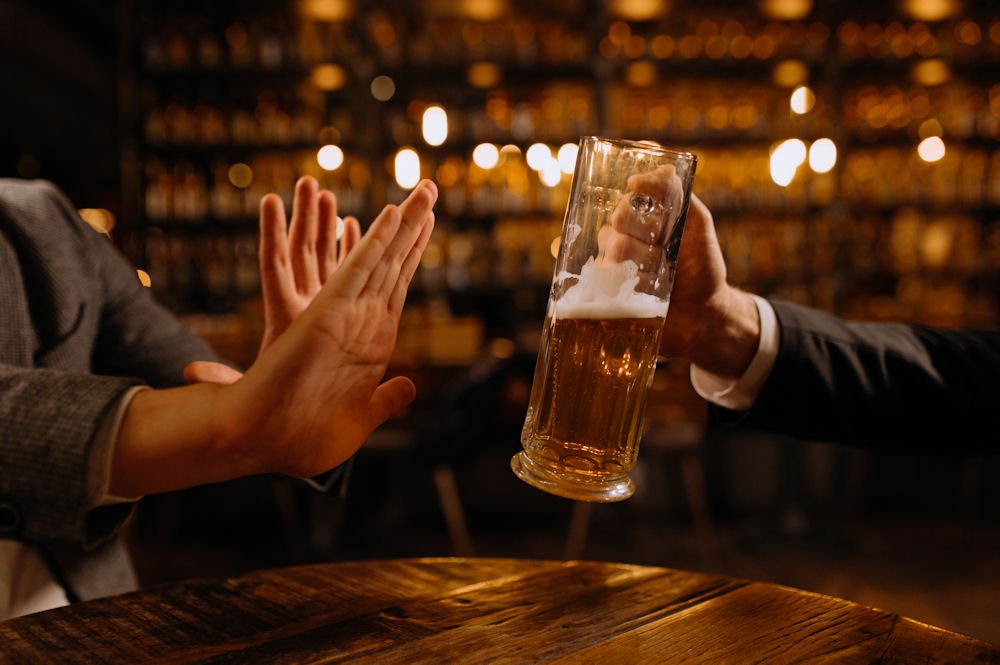Non-alcoholic beers have become increasingly popular in recent years, providing an alternative for those who want to enjoy the taste of beer without consuming alcohol. However, for individuals in recovery from alcohol addiction, the question arises: can you drink non-alcoholic beers in recovery?
Through our alcohol detox program here at Agape Detox, we work to equip you for recovery and freedom from alcoholism. Explore the complexities surrounding this topic and allow us to shed light on whether non-alcoholic beers are suitable for those on the path to sobriety.
Table of Contents
ToggleCan Alcoholics Drink Non-Alcoholic Beer in Recovery?
The answer to this question is not a simple yes or no. While non-alcoholic beers do contain significantly less alcohol than their alcoholic counterparts, they are not always completely devoid of it. The term “non-alcoholic” refers to any beverage containing less than 0.5% alcohol by volume (ABV). This means that non-alcoholic beers may still contain trace amounts of alcohol, albeit in much smaller quantities.
Individuals in recovery must consider their own personal journeys and triggers when deciding whether to consume non-alcoholic beers. Some may find that even the smallest amount of alcohol triggers cravings or jeopardizes their sobriety, while others may feel confident in their ability to navigate the situation responsibly.
It is important to note that the decision to consume non-alcoholic beers in recovery is a highly personal one and should be made with careful consideration. Some individuals may choose to avoid non-alcoholic beers altogether to eliminate any potential risk, while others may feel comfortable enjoying them in moderation as a way to socialize without compromising their sobriety.
Ultimately, the key is for individuals in recovery to stay mindful of their motivations and to prioritize their well-being above all else. Seeking support from a therapist, counselor, or support group can also be beneficial in navigating these decisions and maintaining a strong foundation in recovery.
Understanding Non-Alcoholic Beer: What’s in the Bottle?
Non-alcoholic beers undergo a process called dealcoholization, where the alcohol content is reduced to a level below 0.5% ABV. This process can be achieved through different methods, such as vacuum distillation, reverse osmosis, or alcohol-free fermentation.
Most non-alcoholic beers are made using traditional beer ingredients like water, malted barley, hops, and yeast. These ingredients give non-alcoholic beers a taste and aroma similar to their alcoholic counterparts, making them an appealing option for those seeking a beer-like experience without the effects of alcohol.
Do Non-Alcoholic Beers Have Any Alcohol in Them?
As mentioned earlier, non-alcoholic beers contain less than 0.5% alcohol by volume. While this amount is significantly lower than that found in alcoholic beers, it is not zero. Consequently, individuals in recovery must be mindful of the potential risks associated with consuming even small amounts of alcohol.
It is worth noting that non-alcoholic beers are not intended to be a replacement for the support and treatment programs offered by professionals in addiction recovery. They should be viewed as a recreational beverage, rather than a therapeutic tool.
Non-alcoholic beers are produced through various methods, such as vacuum distillation, reverse osmosis, or simply brewing a beer with very low alcohol content. These processes aim to remove or reduce the alcohol content while retaining the flavors and characteristics of traditional beers.
Some non-alcoholic beers may undergo additional steps, like flavor adjustments or carbonation enhancements, to mimic the taste and mouthfeel of their alcoholic counterparts. This attention to detail ensures that consumers can enjoy a similar sensory experience without the effects of alcohol.
Non-alcoholic beer, often referred to as “near beer” or “alcohol-free beer,” is a beverage that has undergone a process to remove most or all of the alcohol content. While it may seem like a safe alternative for individuals in recovery, it is essential to recognize that non-alcoholic beer still contains trace amounts of alcohol, typically less than 0.5% alcohol by volume.
Are There Any Benefits of Non-Alcoholic Beer?
Non-alcoholic beers offer several advantages for individuals in recovery. Firstly, they provide a sense of inclusion and social integration by allowing individuals to participate in social gatherings where alcoholic beverages are often consumed. It can be a way to feel connected without compromising one’s commitment to sobriety.
Furthermore, non-alcoholic beers can act as a placebo, satisfying any psychological desire for a beer-like experience without the intoxicating effects of alcohol. For some individuals, the taste and ritual associated with drinking beer are comforting, making non-alcoholic beers a viable substitute.
Additionally, non-alcoholic beers are often lower in calories compared to their alcoholic counterparts. This can be beneficial for individuals who are mindful of their calorie intake but still want to enjoy a cold, refreshing beverage. The reduced calorie content in non-alcoholic beer can support weight management goals without sacrificing flavor or satisfaction.
How Does Drinking Non-Alcoholic Beer Harm Recovery?

While non-alcoholic beers may hold certain advantages, they can also present risks to individuals in recovery. One such risk is the potential for triggering cravings or slipping back into old habits. The taste and familiarity of beer may awaken dormant desires for alcoholic beverages, making it challenging to maintain sobriety.
Additionally, consuming non-alcoholic beers in excessive quantities can lead to a false sense of security or complacency. It is crucial to remember that excessive consumption, regardless of the alcohol content, can have negative consequences for physical and mental well-being.
Moreover, the social aspect of drinking non-alcoholic beer can also pose challenges for individuals in recovery. In social settings where alcohol is prevalent, opting for non-alcoholic beer may still perpetuate the association between socializing and drinking, potentially hindering the individual’s progress toward a sober lifestyle.
Addressing Underlying Issues
Non-alcoholic beers should not be relied upon as a means of addressing underlying emotional or psychological issues that may have contributed to addiction. It is important for individuals in recovery to explore alternative coping mechanisms, such as therapy, support groups, and healthy lifestyle choices, to ensure long-term success on their journey to sobriety.
Furthermore, seeking professional help to address the root causes of addiction is essential for sustained recovery. Untreated emotional traumas or unresolved psychological issues can resurface if not properly dealt with, potentially leading to a relapse. Therefore, a holistic approach that delves into the underlying issues contributing to addiction is crucial for long-lasting sobriety.
Drinking Non-Alcoholic Beer in Recovery: The Bottom Line
For some individuals, even this small amount of alcohol can trigger cravings or jeopardize their sobriety. Furthermore, the decision to consume non-alcoholic beer should be accompanied by an understanding of the individual’s reasons for choosing this option. Some may opt for non-alcoholic beer as a way to feel included in social settings where alcohol is prevalent, while others may be drawn to the taste and ritual associated with beer consumption.
It is crucial for individuals in recovery to reflect on their motivations and be honest with themselves about whether consuming non-alcoholic beer aligns with their recovery goals. In addition to seeking professional guidance, individuals in recovery may find it beneficial to explore alternative beverages or activities that can provide a sense of relaxation or enjoyment without the potential risks associated with consuming non-alcoholic beer.
Engaging in hobbies, exercise, or socializing with supportive peers can offer healthy outlets for stress relief and connection, contributing to a well-rounded approach to recovery. Ultimately, the choice to drink non-alcoholic beer in recovery is a deeply personal one that requires self-awareness, support from healthcare professionals here at Agape Detox, and a commitment to prioritizing long-term sobriety.
Agape Detox Offers Alcohol Detox in South Florida

For individuals in South Florida seeking professional help in their journey to recovery, Agape Detox provides comprehensive alcohol detox programs tailored to individual needs. By offering expert medical care, therapeutic support, and a safe environment, Agape Detox assists individuals on their path to a healthier and alcohol-free life.
With a focus on personalized care and attention, our treatment professionals understand the challenges faced by those in recovery and strive to provide the necessary tools for success. Through our evidence-based treatments and compassionate approach, we support individuals in reclaiming their lives from the grip of addiction.
Located in the heart of sunny South Florida, Agape Detox’s facility boasts state-of-the-art amenities designed to promote healing and relaxation. From comfortable private rooms to serene outdoor spaces, every detail has been carefully considered to create a peaceful environment conducive to recovery.
Furthermore, our team of experienced medical professionals and addiction specialists work closely with each individual to develop a personalized treatment plan. This tailored approach addresses not only the physical aspects of alcohol detox but also the emotional and psychological components of addiction, ensuring comprehensive care for every client.
If you are ready to begin your journey to recovery from alcohol use disorder, reach out to us today. We’re ready to help you overcome addiction and find the freedom you deserve!

Stephanie Robilio is an accomplished Clinical Director at Agape Behavioral Healthcare. With a Master of Social Work degree, LCSW license, and extensive training in Rapid Resolution Therapy under her belt, she brings a wealth of expertise to her role. Her unique combination of education and experience allows her to provide exceptional care to clients and lead her team with confidence. Stephanie’s joy comes from witnessing the moments when her patients creatively connect the dots and bravely move toward reclaiming their power. Her purpose is to help individuals understand their past so they can create a future full of hope, growth, and success. Stephanie attributes a large portion of her success to the supportive culture and strong sense of community fostered by the Agape team.





